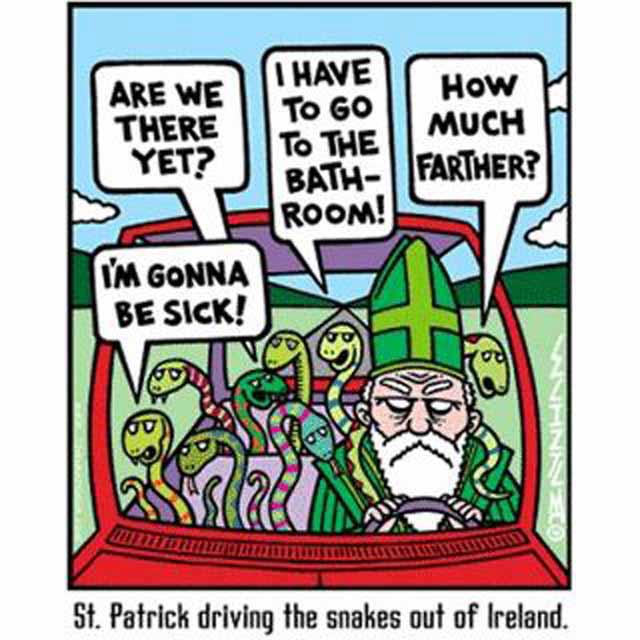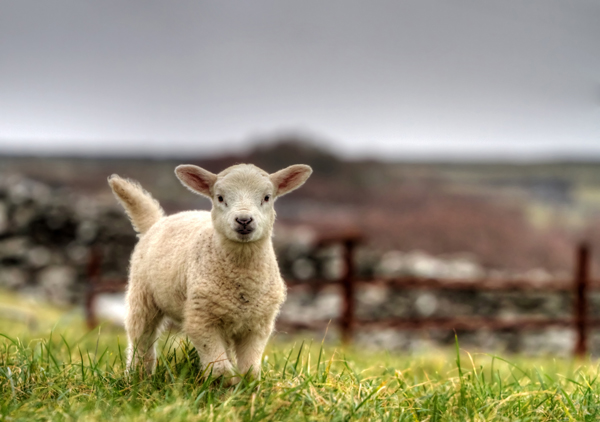Saint Patrick Driving Snakes Out Of Ireland
This Saint Patrick’s Day, when we celebrate all things Irish, I thought about the man Patrick who lived 1500 years ago. Many people credit St. Patrick with driving all snakes out of Ireland. But the truth is, that Ireland, an island surrounded by frigid ocean waters was never home to snake populations. Scientists think, the Emerald Isle’s location simply did not allow for the migration of snakes from Great Britain or any other land mass for that matter.

Because the snake most often represents evil in literature, when St. Patrick drove the snakes out of Ireland, it was not meant to be taken literally, but symbolically meant he drove the old pagan ways out of Ireland and brought in a new age.
The Patron Saint of the Excluded
Patrick was kidnapped as a boy and held in captivity. This experience may be what led him to be the first human being in history to speak out unequivocally against slavery. Showing insight and tremendous courage, Patrick demonstrated the ability to suffer with other people and to express empathy, the ability to understand and share the feelings of others. For this reason, Patrick would become an advocate for the disadvantaged or any being living on the fringes of society. St. Patrick became one of the great saints of the downtrodden and excluded. So what would Patrick think of us for despising snakes for no good reason?
Ophidiophobia is the term for an irrational fear of snakes. Many people, maybe even a majority of humans, openly say they hate all snakes. Snakes do not have limbs, eyelids or ears. They are covered in scales, have forked tongues and are master contortionists. Their physical appearance alone is reason enough for many humans to despise a snake, but is that fair?
Other than loathing a snake for its appearance, most will admit that they are truly afraid of being bitten by a snake. But in our world today, the fear of snakes is out of proportion with the danger that snakes pose to human beings.
Truth is, snakes rarely bite people. When a snake does bite, it is in response to being picked up, poked at, or otherwise disturbed. People living in the United States and Canada are more likely to die of influenza, bubonic plague, salmonella poisoning, measles, being struck by lightning, a heat wave, fire, choking, or falling in the bathtub than by being bitten by a snake.
Snakes are Victims of Bullying
The best way to avoid being bitten by a snake is to simply leave the snake alone. All snakes will bite, even non venomous ones if they are harassed. The snakes will even give fair warning whether by a rattle of the tail, expanding its neck like a cobra, or by hissing a clear warning. If after given fair warning, you decide not to back off, then the snake may very well bite in self-defense.
Medical professionals report that between 40 to 100 percent of the venomous snakebite victims they have treated have been under the influence of alcohol, and the majority have been young men. One could conclude that poor judgement and bullying seems to be the largest risk factor for being bitten by a snake.
Snakes Share our Planet for a Reason
Most snakes are useful gardeners. They go about their business controlling the rodent, slug, snail and other garden pests in the way nature intended. Some blind snakes even consume termites! You might even welcome a Black snake into your yard, as they prey on Copperheads. For this, they ask for no praise or accolades, but silently continue their good work.
 The snake is the symbol of medicine, toxicology and toxinology. The snake figure was associated with Asclepios, the ancient Greek God of medicine. The snake was believed to possess benevolent properties and to be able to cure a patient just by touch.
The snake is the symbol of medicine, toxicology and toxinology. The snake figure was associated with Asclepios, the ancient Greek God of medicine. The snake was believed to possess benevolent properties and to be able to cure a patient just by touch.
The snake is symbolic with pharmacology and antisepsis, as they possess an antivenom against their own poison. The study of snake venom has brought about beneficial pharmaceutical and drug development playing a crucial role in physiological processes such as the regulation of blood pressure, conduction of nerve impulses, immune responses, and the regulation of cardiac rhythm.
So you see, snakes are good creatures too, with a purpose and the right to live on and share our planet.
Must Love Snakes! All Life is Precious and Deserves Protection
As we celebrate St. Patrick, the Patron Saint of the Excluded, who taught us by example that all life is precious, I wondered what Patrick would think about the snakes that have been stuck with a bad rap. I think he might ask us to embrace all snakes, symbolically not literally of course. St. Patrick might ask us to think about all creatures no matter how big or small, and to remember that all life is precious and deserves our respect and protection.

Wonderful informative post about Snakes and St. Patrick, Gracey. Thank you for sharing. Although I must admit I am not a *fan* of snakes, I have never disliked them or harmed them. I just prefer they stay away from me (as I am sure they feel the same way). For awhile last summer there was a snake that spent alot of time in some bushes next to the wall and gate in my driveway. I have a dirt driveway and I would see his trail coming and going in the dirt all the time. I called him *Sneaky Snake* and would talk to him when I walked through the gate several times a day. I was very sad when I came home one night to see that he had been killed in the street by a passing vehicle 🙁
I have always liked and admired snakes. If you look closely at their patterns, they are quite beautiful. When I was a kid, I volunteered at the Bronx Zoological Society. They had a program where we got to learn about a variety of animals, and the treat was being able to handle some of them. For me, it was a Boa Constrictor at the Children’s Zoo. I would talk about this snake to camp kids who would visit, and I got to hold them. They are not at all slimy as some people believe.
I did not know St. Patrick’s history. Thanks for shedding light on that. I’m sharing!
I enjoyed this and my kids love snakes but have the common sense not to bother them.
Thank you for loving snakes and for teaching your children to respect them too. Super Hurrah!
Must Love Snakes here!!! Thanks for sharing the insight! xoxox
Thank you for loving snakes too!